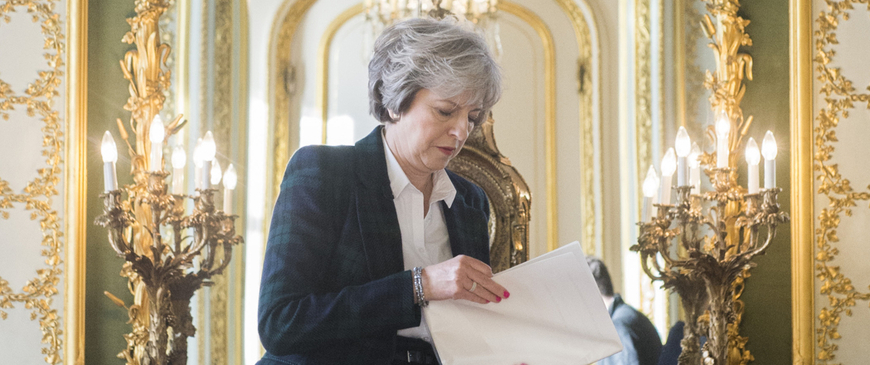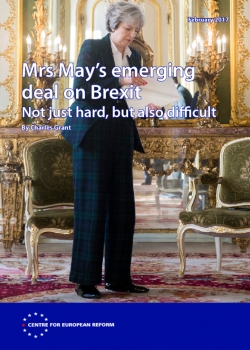
Mrs May's emerging deal on Brexit: Not just hard, but also difficult
- Theresa May has set out her plan for Brexit: the UK will leave the single market and the customs union, and seek a free trade agreement (FTA) with the EU. But in Brussels key policy-makers worry that she may not succeed – either because the ‘Article 50’ divorce talks collapse in a row over money, or because the two sides cannot agree on the transitional arrangements that would lead to the FTA.
- EU officials are pessimistic because they observe the pressure May is under from hard-liners to take a very tough approach to the negotiations. They see limited pressure on her for a softer Brexit. But several factors could favour a less-than-very-hard Brexit: a majority of MPs wants to retain close ties with the EU, as do business lobbies; and an economic downturn (if it happens) could steer public opinion away from supporting a clean break.
- In May’s government, 10 Downing Street takes all the key decisions. The downside of this centralisation is that decision-taking may be delayed, and particular proposals may be tested on too narrow a circle of experts.
- The outcome of the Brexit talks will be shaped to a large degree by the EU governments. They are mostly united in taking a hard line. Worried about the cohesion and unity of the EU, they do not want populist leaders to be able to point to the British and say, "They are doing fine outside the EU, let us go and join them." Exiting must be seen to carry a price.
- The British government has yet to decide what it wants on some key issues, such as: what sort of immigration controls should it impose? What kind of special deal, if any, should it seek for the City of London? What customs arrangements will it ask for? What sort of court or arbitration mechanism would it tolerate? And what transitional arrangements does it want?
The arrival of #Trump has boosted the self-confidence of those who want to cut ties with the EU.
- Britain’s strongest card is its contribution to European security. The arrival of Donald Trump could help the UK, by giving continentals an extra reason to keep the UK engaged; but if the British become too chummy with Trump, they will lose the goodwill of EU governments. Britain’s other cards are weaker. It regards the City of London as a European asset that should be cherished by all – but that is not how most of the 27 see it. Nor should the UK try to claim that since the 27 have a trade surplus with it, they need a good trade deal more than it does; the reality is that Britain depends more on EU markets than vice versa. Finally, May’s threat to respond to a bad deal by transforming Britain into a low-tax, ultra-liberal economy lacks credibility.
- There are only three possible outcomes of the Brexit talks: a separation agreement plus an accord on future relations including an FTA; a separation agreement but no deal on future relations, so that Britain has to rely on WTO rules; and neither a separation agreement nor a deal on future relations, so that Britain faces legal chaos and has to rely on WTO rules.
- Once Britain triggers Article 50, it is in a weak position: it must leave in two years, and if it has not signed a separation agreement before doing so, it risks economic chaos. So if Britain wants a half-decent deal, it needs the goodwill of its partners. That means ministers should be polite, sober and courteous. Grandstanding and smugness will erode goodwill towards the UK. As for the substance of the negotiations, the more that Britain seeks to retain economic and other ties, the more likely are the 27 to offer a favourable deal.
If MPs vote down the deal, the government may be obliged to ask the 27 for a softer #Brexit.
Whatever happens in the negotiations, Brexit will be hard. That is because both the UK and the 27 are placing politics and principles ahead of economically optimal outcomes. In the very long run, once both the UK and its partners have understood that a hard separation is not in anyone’s interests, serious politicians will start thinking about how to engineer closer relations.


Comments
All together we were 5½ million who were muzzled because Parliament considered us either (i) too young (1.5 million, though 16- and 17- year olds can vote in Jersey, Guernsey, Austria, Argentina, in Scottish elections... and giving them the vote is SNP, Labour & LibDem policy; further, youngsters would provide a counterweight in an increasingly geriatric population), (ii) too long abroad (perhaps 2.0 million; my case; in violation of Article 21(2) of the UN Universal Declaration of Human Rights “Everyone has the right to take part in the government of his country, directly or through freely chosen representatives,” and even the Conservative Party considers this exclusion unjust, with its as-yet unkept “Votes For Life” manifesto promise, or (iii) too foreign (2.2 million; all permanent residents can vote without restriction of nationality in Jersey, Guernsey, New Zealand, Chile (after 5 years) …). 5½ million is quite a democratic deficit when the “Leave” majority was only 1.3 million.
On leaving the CU, there must be a visible and active customs presence at the external frontier of the EU. The Irish land frontier, ports and airports, anywhere that is involved in the import and export of UK goods.
The EU side will apply the new UCC and related provisions, and continue to progress with the ambitious UCC IT Work Programme and transitional measures. The EU customs law does not stand still.
It is unclear what the UK customs legislation will look like. During the long negotiations leading up to the adoption of the UCC, the UCC was clearly seen as a compromise piece of legislation. Perhaps the UK will use the opportunity to unilaterally update, modernise and "improve" on the UCC. Greater simplification, clarity on issues such as the role and definition of an exporter, and the use of guarantees are easy targets to improve upon.
This however will create problems with the EU side in looking to have mutual recognition of provisions and procedures. How will for example an AEO in the UK compare with an AEO throughout the EU?
I am not sure if it is disappointing or welcome that the business community is (finally) waking up to the implications of increased customs costs. In working last year with an EU trade association directly involved in customs, I can confirm that the transport, logistics and freight forwarding industry were extremely aware and concerned in the lead up to the vote.
I cannot emphasise enough the importance of equivalence and mutual recognition to ensure cooperation and coordination between EU customs authorities and third countries. However this takes time and effort and expertise to establish and more importantly to maintain such equivalence.
The relationship between the CU and the Single Market (SM is also critical. The examples of Turkey and the EFTA EEA countries show the advantages and the clear disadvantages in being in one or the other of the CU and SM. Either choice comes at a price - financial costs, delays, administrative burdens and ultimately a lack of competitiveness.
The phrasing with regard to the unlikely option of pushing the EUs centre of gravity from Brussels Berlin and Paris is particularly true. I place Brussels first in line there, I believe the EU institutions, the Commission in particular, will fight hard to keep the Union as united as possible.
Finally with regard to an EU UK FTA, yes the timescale is challenging, and the risk is that it will be a poor first effort. Non tariff barriers will exist, impacting on the flow of legitimate traffic. Increased rules of origin checks, an increased level of interest from OLAF in protecting EU funds and the increased importance and role of customs in protecting EU citizens will inevitably result in increased costs, a lack of competitiveness and potential job losses.